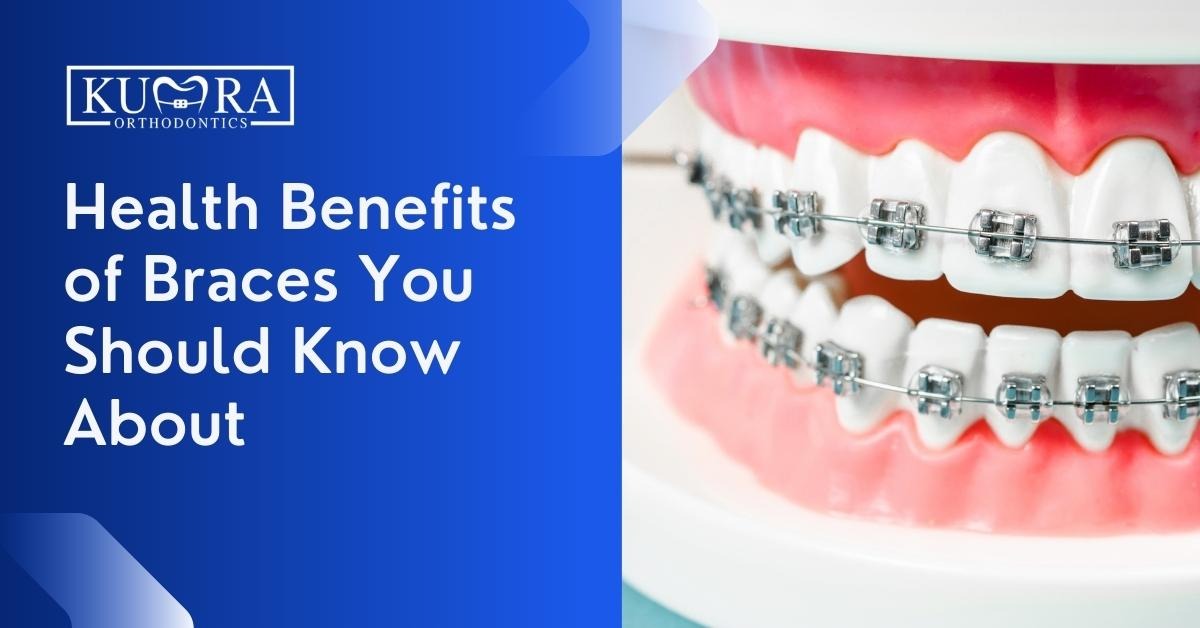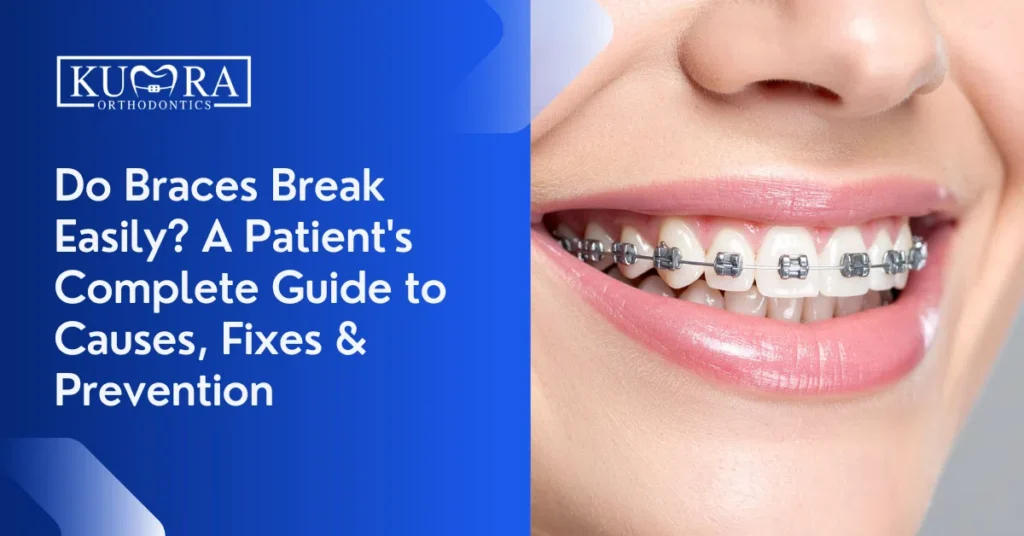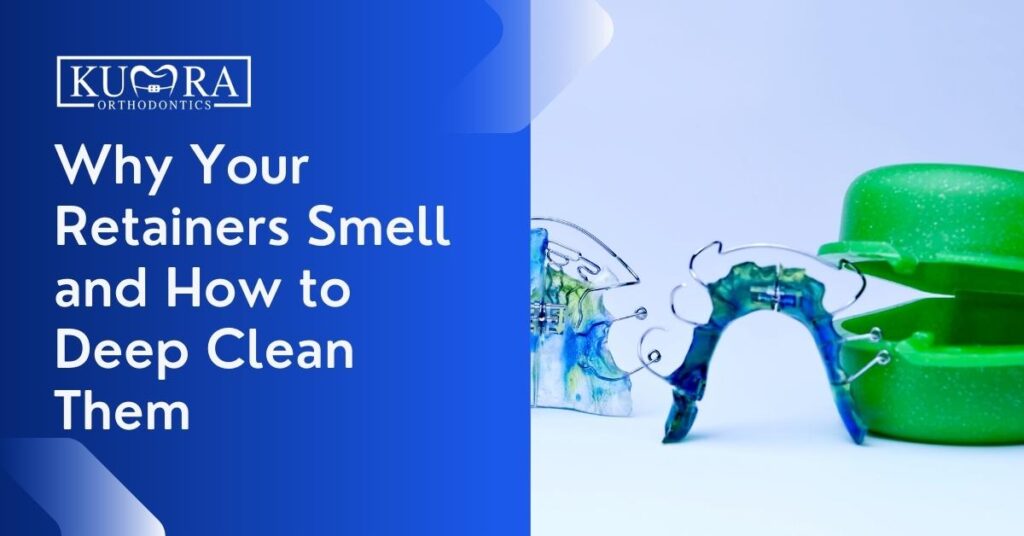According to the American Association of Orthodontists, orthodontic treatment aids in the development of beautiful, healthy smiles by ensuring that teeth function properly. You can bite, chew, and talk more easily if you have a good bite. On the other hand, teeth with alignment issues contribute to excessive wear on the tooth’s enamel, necessitating more time and money spent in the dental procedures. This underscores the benefits of braces in maintaining dental health.
When it comes to maintaining a vibrant smile, orthodontic braces do more than ensure your selfies shine; they’re crucial in addressing conditions like crooked teeth, disproportionate teeth, and unaligned teeth, significantly enhancing oral health. But the advantages of properly positioned teeth extend far beyond aesthetics. Here’s how the strategic positioning of teeth through braces can have a ripple effect on your long-term health benefits.
How Do Braces Work?
Braces work by applying continuous pressure over a period of time to slowly move teeth in a specific direction. The bone changes shape as the teeth move, allowing for the realignment of the teeth within the jaw. This process is facilitated by the brace’s components, such as brackets attached to each tooth and connecting wires that are periodically tightened by the orthodontist to guide the teeth into the desired position. Over time, this controlled movement corrects misalignments, resulting in improved bite and alignment of teeth.
Health Benefits of Braces
Embarking on a journey with braces not only transforms your smile but also brings a multitude of health benefits. Let’s explore the key ways braces can enhance your overall dental and mental well-being.
Aligns Teeth
Proper tooth alignment is essential beyond aesthetic appeal. Misaligned or unaligned teeth can lead to an uneven bite, stressing certain teeth. This stress can cause premature wear and more severe impacts on upper teeth. Correcting alignment with braces distributes biting pressure evenly, preventing tooth erosion and issues linked to an improper bite.
Protects Against Bone Erosion
The positioning of teeth is crucial in supporting bone health. Misaligned teeth can put abnormal stress on gums and the jawbone, leading to bone erosion. Braces correct this alignment, significantly reducing the risk of bone erosion. This preservation of bone structure prevents severe tooth loss typically resulting from deteriorating bones.
Boosts Self-Esteem
The alignment of teeth isn’t just a dental concern; it profoundly influences mental health. Individuals with crooked teeth often experience self-consciousness or anxiety about their appearance. Braces correct these dental issues, straightening teeth, enhancing self-esteem, and positively impacting mental well-being.
Improves Digestion
Efficient chewing, the first step in digestion, relies on straight teeth. Misalignment can hinder proper food breakdown, leading to digestive issues. Post-braces, patients often experience improved chewing abilities, enhancing their overall digestive health.
Mitigates Speech Difficulties
Teeth alignment affects speech clarity. Crooked or disproportionate teeth can hinder clear speech, causing frustration and embarrassment. Braces aid in correctly positioning teeth, overcoming speech difficulties, and enabling clearer, more effective communication.
Needing an orthodontic appointment?
Needing an orthodontic appointment?
Visit Kumra Orthodontics Washington, DC or Kumra Orthodontics Stafford, VA, and request an appointment with us!
How To Maintain Good Oral Hygiene with Braces
Maintaining good oral hygiene with braces is crucial to prevent dental problems like tooth decay and gum disease. Here are some key tips:
Brush Regularly
Brush your teeth at least twice a day, paying special attention to the areas around the braces where food particles can get trapped. Use a soft-bristled toothbrush and fluoride toothpaste, angling the brush to clean around wires and pins.
Floss Daily
Flossing with braces is crucial to remove plaque and food particles between teeth and under wires. Use a floss threader or orthodontic floss to navigate around the braces, gently moving the floss up and down against each tooth.
Rinse with Mouthwash
Incorporate an antiseptic or fluoride mouthwash into your daily routine to help kill bacteria and reduce the risk of cavities. Rinse thoroughly for 30 seconds, ensuring the mouthwash reaches all areas around the braces.
Regular Dental Checkups
Schedule regular appointments with your orthodontist and dentist. These professionals will monitor your braces’ progress and address any hygiene issues, such as plaque buildup or gingivitis, ensuring your teeth and gums remain healthy throughout the treatment.
Avoid Certain Food
Be mindful of your diet; avoid hard, sticky, or sugary food that can damage braces or get stuck easily. Foods like popcorn, nuts, caramel, and hard candies can break wires and brackets, while sugary foods can increase the risk of tooth decay.
Factors to Consider Before Getting Braces
Before getting braces, it’s important to consider several factors to ensure you’re making a well-informed decision:
Type of Braces
There are various types of braces available, including traditional metal braces, ceramic braces, lingual braces, and clear aligners. Each type has its pros and cons in terms of visibility, comfort, cost, and treatment time.
Cost and Insurance Coverage
Braces can be a significant investment. Understand the total cost and check with your insurance provider to see what portion, if any, is covered. Also, consider the potential need for additional dental work, like extractions or fillings, before getting braces.
Treatment Duration
Braces typically need to be worn for one to three years, depending on the individual’s dental needs. Consider the commitment required and discuss with your orthodontist the estimated duration of your treatment.
Lifestyle Adjustments
Wearing braces may necessitate changes in diet and lifestyle. Hard, sticky, or chewy foods might need to be avoided to prevent damage to the braces. Additionally, if you play contact sports, you’ll need a special mouthguard.
Braces Frequently Asked Questions (FAQs)
What Is A Good Age To Get Braces?
While braces can be effective at any age, the optimal time to start treatment is typically during childhood or adolescence. The American Association of Orthodontists recommends that children have their first orthodontic consultation no later than age 7. This doesn’t mean they will get braces right away, but it allows the orthodontist to monitor the growth of the jaw and the development of teeth.
Are Braces Really Worth It?
Yes, braces are worth it for many reasons. Beyond the obvious benefit of straightening teeth for aesthetic reasons, braces can prevent a variety of oral health issues. Properly aligned teeth reduce the risk of tooth decay, tooth erosion, and gum disease by making it easier to maintain dental hygiene. They can also correct bite issues that may lead to difficulty in chewing or speaking and reduce the risk of injury from protruding teeth. Moreover, the psychological and social benefits of a confident smile can have positive effects on one’s quality of life and mental health.
Contact Kumra Ortho To Learn More About The Benefits Of Braces
Braces have benefits that go beyond a beautiful smile. While teeth and jaws that are misaligned can affect your appearance; they can also affect your overall health. You may have increased difficulty eating and speaking, and your oral hygiene routine may seem to become less effective over the years. Far from only straightening teeth, orthodontic treatment can address many of these issues.
Kumra Ortho can help assess your needs and provide you with the best treatment possible. We offers personalized care and state-of-the-art technology, ensuring a comfortable and effective treatment experience tailored to your unique smile. Contact us today to learn more about braces and how we can improve your smile!





